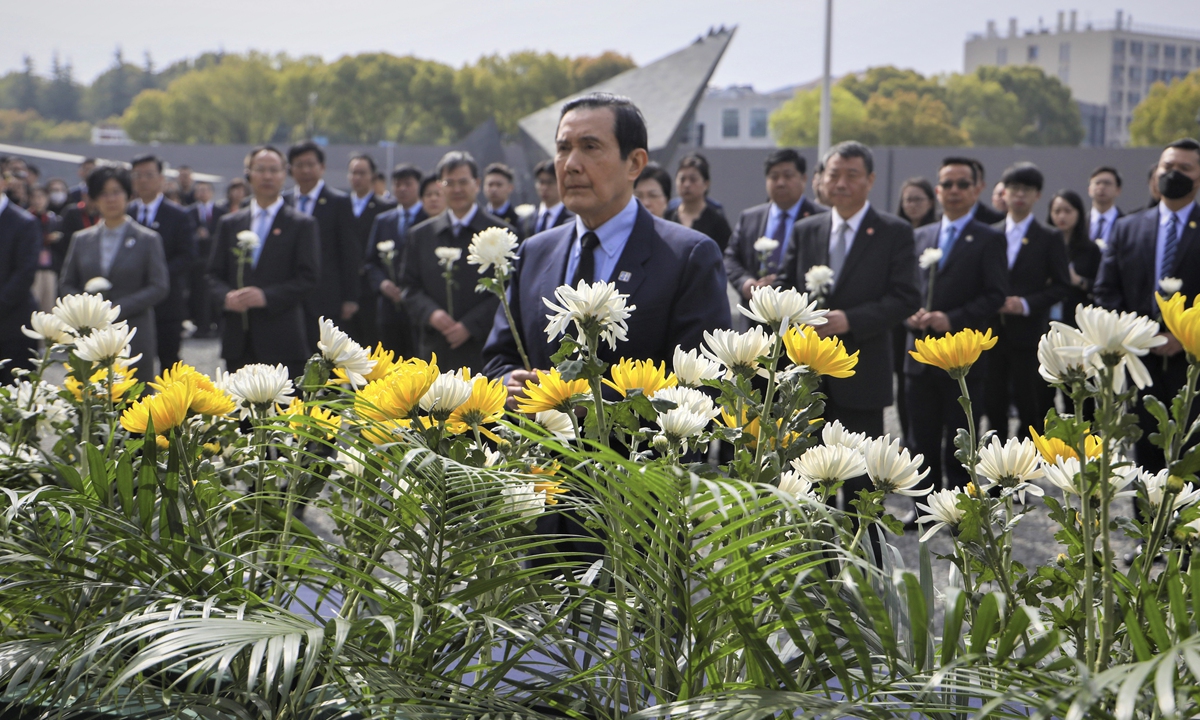
Ma Ying-jeou. Photo: CFP
"History must never be forgotten… all of us Chinese should stand on our own two feet so that we will not be bullied or trampled on," Ma Ying-jeou said on Wednesday at the Memorial Hall of the Victims of the Nanjing Massacre by Japanese Invaders in Nanjing, as the former chairman of the Kuomintang (KMT) party continues his 12-day mainland visit.
Ma, also the former regional leader of Taiwan island, visited the memorial hall that embodies the memory of suffering and humiliation and high patriotic enthusiasm on Wednesday morning, saying that he was unprecedentedly shocked in emotion after closely seeing massacre-related artifacts, historical materials, photos and other materials.
Before entering the memorial hall, Ma, dressed in a dark suit and wearing black tie and holding a white chrysanthemum, walked to the wall of remembrance for the victims to lay wreath and pay a silent tribute.
On December 13, 1937, Japanese troops seized Nanjing and committed horrible atrocities, including rape, arson, looting, mass executions and torture. The striking sign that reads "300,000 victims" on the memorial wall engraved a collective and painful memory for all the Chinese people.
Ma entered the exhibition hall to learn about the atrocities committed by the Japanese army, humanitarian aid, Nanjing after the massacre, and post-war investigation and trial. Ma looked sorrowful and even choked up during the interview, according to Taiwan-based media.
"I have read some books and photos about the history of the Nanjing Massacre, but I have never been so shocked as today. This is a rarely barbarous act in human history, and the Chinese people are the biggest victims," Ma said.
Ma told media that Chinese people, no matter on which side of the Taiwan Straits, "should be self-reliant and resist bravely in facing of outside bullying."
In the guest book, Ma wrote that "History must never be forgotten" in Chinese calligraphy.
Liao Yuan-hao, an associate professor with Soochow University in Taiwan, is also traveling as part of Ma's delegation. He told the Global Times on Wednesday that resistance against Japanese aggression was a great collective action of the Chinese people, regardless of party, and the Nanjing Massacre was the greatest suffering experienced by China in modern times.
He said the Japanese invaders' act was inhuman, and visiting the memorial hall could be an opportunity to convey a message to the mainland: Chinese people in Taiwan can also feel the same way about our nation's suffering.
Lin Yen-liang, a 26 year-old student among Ma's delegation, told the Global Times that textbooks in Taiwan under DPP authorities have little detail about the Nanjing Massacre, without mentioning actual number of victims. After this visit, he felt very sorrowful and also angry for the past foreign bullying against the Chinese nation.
Lin believes that Taiwan's education of Chinese history should be strengthened to avoid the younger generation receiving only snippets of historical information.
The Memorial Hall of the Victims of the Nanjing Massacre by Japanese Invaders in Nanjing was completed and opened to public in August 1985. A large number of precious cultural relics and historical materials in the museum tell the world the history with irrefutable facts. The three basic exhibitions display nearly 4,000 photos, nearly 10,000 cultural relics and more than 260 video materials, according to Xinhua.
The memorial hall is one of the first national patriotic education bases and national key cultural relic protection sites. Since December 13, 2014, the memorial hall has been a regular venue for the national Memorial Day for the victims of the Nanjing Massacre.
Ma on Tuesday visited John Rabe House, the home of German businessman Rabe who stayed during the Nanjing Massacre in 1937 and protected more than 600 Chinese in his house from the brutality of Japanese troops.
Ma has repeatedly urged the Japanese government to apologize and compensate the "comfort women" in Taiwan, so as to heal the historical wound. During Ma's tenure, he has met the victims forced into sexual slavery by Japanese troops and provided them with living assistance.
Ma is also scheduled to visit historical sites where the KMT participated in the War of Resistance against Japanese Aggression (1931-45), including Sihang Warehouse Battle Memorial in Shanghai, and the Chongqing Anti-Japanese War Heritage Museum.




